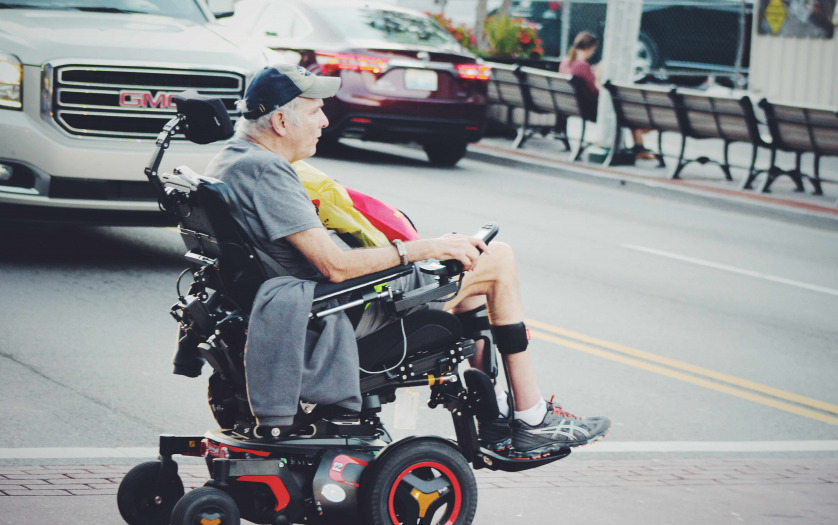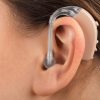Electric wheelchair market needs disruption and ‘tech giants’

Stop waiting for the next Permobil or Sunrise Medical Quickie. What the electric-powered wheelchair market needs is a tech giant, writes Colin Hughes.
I have been using an electric-powered wheelchair for more than 40 years. In the 1980s they were very basic and did little more than take you from A to B.
Thankfully, over the decades electric wheelchair technology has progressed and today there are a lot more options for users. Actuators will let you tilt the seat, recline the backrest, extend the leg rests, and raise and lower the height of the seat, all with the press of a button.
Yet improvements like these have still left me with a big question: “What’s the next real innovation?” A voice-driven electric-powered wheelchair?
Instead of looking toward traditional technological advances — to understand the electric-powered wheelchair’s future, it’s time to look at how smart electric wheelchairs can become.
In short, the electric-powered wheelchair market doesn’t just need a new intelligent steering or suspension system. It needs a tech giant to create a disruption and take them to another level.
Powered wheelchairs today are not very smart. While some wheelchairs have the option of Bluetooth modules for certain functions, and companies like Permobil provide an app that will give you information on individual battery range estimates, distance and seating behavior, no one’s thought to revolutionize the electric wheelchair by integrating voice-controlled smart technology.
It’s got me wondering if I can interest the tech giants, Google, Amazon, or Apple in developing a device that allows electric wheelchair users to take Alexa, OK Google, and Hey Siri with them, fully integrated into their wheelchairs, outside of the home.
Voice assistants are ubiquitous in my home with Amazon Echo smart speakers dotted about the place to control the number of smart home devices with my voice but outdoors it is a different story altogether.
For this reason, I have long wanted to “Alexafy” my electric wheelchair so the Amazon Alexa voice assistant is integrated and with me when I go outdoors. I don’t want a self-driving wheelchair, or to control the functions of the electric wheelchair with my voice, (although that could be quite cool), but I do want to be able to take the Alexa voice assistant with me outdoors; to check the weather, make calls, get directions, check my calendar, and send messages.
The issue I face is while I can take Alexa with me outside, with a combination of a mobile phone and Amazon Echo Buds, this is dependent on having a carer around to put the wireless earbuds in my ears, and the mobile phone in the side pocket of my wheelchair. I cannot do these two things independently as I am essentially quadriplegic with little movement in my hands and arms.
It means that I can’t be spontaneous and leave home on my own independently and still be connected; important for safety, and for keeping in touch with people on the go.
This issue has got me wondering if Amazon, Google or Apple could assist with the ambition of Alexafying, Sirifying or Googlefying my electric wheelchair, by developing a device that could achieve this for everyone who uses an electric wheelchair. Perhaps they could call such a product “Alexa Wheel”, “Google Wheel” or “Apple Wheel”.
If my concept is to become reality there are two initial requirements:
1 – Power
Most electric wheelchairs have two 12 volt car batteries under the seat so power will not be an issue and the manufacturer of my wheelchair, Permobil, does a USB charging unit that pulls power from the wheelchair batteries for powering phones and tablets.
2 – Internet connection
I would like to keep this separate from my mobile phone, as I cannot pick up my phone myself, so if I left home without my phone I would not have data and an internet connection. I will need an integrated internet connection fixed the chair at all times such as a USB data dongle, or a separate phone.
3 – Possible options
There are a few gadgets on the market which could assist with integrating a voice assistant.
I thought of Amazon’s Echo Auto, which adds the Alexa experience to cars. With 8 microphones, it will pick up my voice far better than a mobile phone, even outdoors.
However, the Echo Auto does not have a speaker and requires a connection to the Alexa app on my phone so I would need to take the phone with when I leave home, which is not always possible.
Possibly, a Echo Dot smart speaker could be used as an alternative to the Echo Auto. I know that some Echo Dot users had been experimenting using the Dot in cars and outdoors. The Echo Dot does have a speaker. It would still have the same issue of having to have my phone with me when going out.
I have tried fixing various mounts to my wheelchair to hold a mobile phone but I have found them cumbersome, get in the way when trying to get under sinks or tables, and they are not aesthetically pleasing. I am looking for a wholly voice-driven and discreet solution where I don’t need to look at a screen.
If the internet connection is not going to rely on my mobile phone then I will need some kind of internet dongle with a data plan, which I would organize myself. I’m not sure what is on the market but it would need to work with the Amazon, Google, or Apple hardware is chosen or developed. It would also need to be mounted and powered by the wheelchair.
My wheelchair is privately owned and out of warranty so I don’t mind anyone tinkering around with it in terms of fitting or mounting devices.
A convenient by-product of this solution is I would need fewer smart speakers about my home as Amazon’s assistant would always be with me by being in my wheelchair at all times.
I very much doubt anyone has tried to Alexafy or Googlefy an electric wheelchair in this way before so I doubt there is an off-the-shelf solution. However, I am fairly confident that using a combination of hardware, and an internet data plan, it should be possible to come up with something to solve the problem I am experiencing.
This is not something I could do myself but I’m hoping engineers at Amazon, Google or Apple have the imagination, expertise, and sense of inclusion to come up with a solution; not just for me but perhaps something like the Echo Auto could be developed that could be sold to electric-powered wheelchair users worldwide.
The premise is simple and straightforward; to provide a hands-free, voice assistant experience that severely physically disabled electric wheelchair users can use outside the home. As with all consumers of technology, it’s all about convenience, but also independence.
A big market
The potential market for such a solution is large.
I am based in the UK and according to the NHS, there are 1.2 million wheelchair users in the UK.
In the US it is 3.6 million.
6.8 billion dollars: This is the combined projected value of the power and manual wheelchair market in the US in 2018. That’s a lot of money!
Granted, the market is not as big as the car market but it is not a small market either.
Ultimate smart powered wheelchair
Rather than just an add-on device, things could be taken further with a designed by Amazon, Google, or Apple state-of-the-art smart electric wheelchair. Call it “Alexa Wheels” or “Google Wheels”, for example.
The clever engineers at these tech giants could add in health and biometric features, such as a seat plate that measures your weight whenever you, or your health professional, need to know, and a joystick control that measures your heart rate and blood oxygen levels as you grip it. After all, the powered wheelchair is the ultimate wearable.
Governments around the world buy millions of electric wheelchairs for their citizens as do private individuals. Why not a Amazon, Google, or Apple electric powered wheelchair.
The electric wheelchair with its onboard source of power and control functions is tailor-made to be Alexafied or Googlefied and would be a boon to many who spend all of their daily lives in one.
It’s clear from the development of the recent Google Pixel Buds, and Echo Buds, tech giants are trying to offer users the convenience of the voice assistant experience outside of the home. Here is a way they can do this for a sizeable group of people who would benefit from the opportunity in terms of health, and independence.
A smart electric wheelchair market with products from the tech giants could be great for the industry-leading to more competitive pricing and more customer interest, choice, and independence.
However, all this blue-sky thinking is a world away at the moment. I have written to the tech giants with my concept and I am awaiting a reply.







